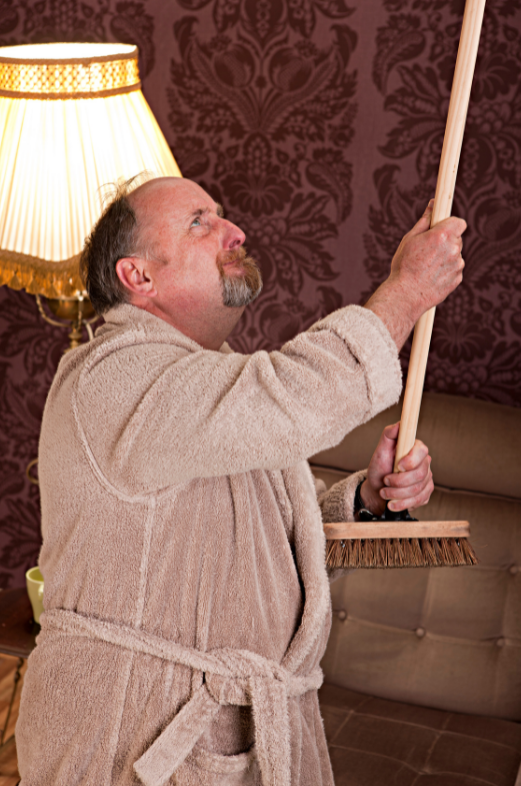Noisy upstairs neighbors are a problem many people deal with. If you’re a renter of an apartment, you’re probably aware you’re going to hear some noise from those who live above and below you, but if the noise is constant or very loud, it can severely impact on your day to day life and make your home a place you would rather avoid than spend time in.
You might feel like screaming at them, or grabbing your broom and jabbing it at the ceiling. Fortunately, there are ways in which you can deal with noisy neighbors that won’t get you kicked out of your apartment. Below we have listed the ten best methods to drown out sounds from those who live next door, so keep reading on to find out more.
Types Of Noise You Are Hearing
Before we get into the methods of dealing with your noisy neighbors, we need to understand why you are hearing the noises you are.
Sound is made when objects vibrate, which makes the air around the object vibrate and the air vibrations enter your ear. Think about banging your hand on the table and how loud that would sound — this is due to the table vibrating as your hand hits it, and then that sound travelling through the air. The sound waves will also bounce off walls, floors and other hard surfaces in the room, which is why you sometimes hear echoes.
There are five characteristics of sound — frequency, wavelength, time-period, amplitude and speed. Frequency of sound is very important when it comes to dealing with noisy neighbors, because, although sounds of the same volume pass though a wall, sounds lower in frequency will penetrate a surface more easily than sounds with high frequency. Low frequency sounds lose less energy as they pass through a solid object. This is why you might be able to hear the low murmurs of a TV show from the apartment below, but not be able to make out the higher pitched voices and words the actors are actually saying.
Of course, amplitude is also very important in terms of neighbors. You’re going to be able to hear a couple that live below you having a loud argument a lot more than you would if they were just talking at their usual volume.
Sound from your neighbors will travel up through the floorboards, down through the ceiling, or through pipes in the construction of the building. Basically, sound will travel wherever there is hollow space, and it will leak into your apartment and cause noise disturbances.
There are two main types of noise you will probably hear from those who live around you: impact noise and airborne noise. Let’s take a look at them in more detail.

Impact Noise
Impact noise is the type of noise you hear when an object comes into physical contact with your neighbors floor or ceiling. For example, if they’re doing a workout, bouncing a basketball or maybe even just walking, you’ll be able to hear it because something is physically touching the floor. The floor then vibrates, and the sound travels to your apartment. This is the type of noise you will hear from the neighbors that live above you, and less so from neighbors who live below you.
Airborne Noise
Airborne noise, on the other hand, is sound that doesn’t come into direct contact with your neighbor’s floor or ceiling. Noises such as loud music playing, a blender being switched on or even your neighbors talking are examples of airborne noise. These noises have to be loud enough to travel through your floorboards or ceiling for you to hear them.
10 Ways Of Dealing With Noisy Upstairs Neighbors

Now we know about the different types of noise, we can go about trying to find a solution. Below we have ten different methods for dealing with noisy nieghbors, some of which will muffle and reduce the noise, and others which will block the noise out completely.
Reduce The Noise
1. Use White Noise
White noise can be a fantastic way to help drown out unwanted sounds in your home. White noise works by generating multiple frequencies at once, so it effectively blocks out lots of different noises.
It also has a calming effect, and can be used for meditation and can even help you to sleep better. You can use a white noise machine, or you can download a white noise app on your phone. For the best sound coverage, we recommend you set up white noise in every room, and therefore you can enjoy it all around your home.
If you don’t want to download an app or use a white noise machine, there are a few appliances in your home that generate their own white noise. These include air conditioning and fans. If you have either of these running, you may find that any sound from your neighbors is reduced.
2. Noise Cancelling Ear Buds
Noise cancelling ear buds are a temporary fix, but one that can really help, especially if the noise from your neighbors is keeping you up at night. You can use noise cancelling ear plugs as you are falling asleep to help reduce any noise that is heard.
If the noise is also disturbing you during the day while you are trying to listen to music, watch TV or enjoy gaming, you may want to buy some noise cancelling headphones. With these, you’ll be able to hear the sounds from your device, but noise from your neighbors will be blocked out.
3. Use Sealant
Using a sealant is a great way to DIY soundproof your home. You can use a sealant on areas where there are gaps and cracks, for example where the walls meet the ceiling or around light fixtures. Sound will find their way through these cracks, so adding in a sealant can prevent vibrations from leaking through.
Another thing to mention is that doors and windows often let sound in, even when they are closed. You can add sealant to the gaps around your windows (we recommend asking your landlord about this one) and use weatherstripping between the door and door frame to create a seal when closed. If there are gaps underneath the door, try a door sweep.
4. Soundproof The Ceiling
The thicker a surface is, the harder it is for sound to pass through. Therefore, adding mass to a surface will increase it’s thickness and reduce the sound heard through it. Soundproofing your ceiling can be a great way to keep noisy upstairs neighbors quiet.
However, soundproofing a ceiling can be a little difficult, mainly because your landlord probably won’t like you to install too much. However, you might be able to get away with adding some temporary ceiling clouds to the ceiling, which are acoustic panels that hang from the ceiling and can reduce noise and echoes.
If your landlord is on board, you could also add some Mass Loaded Vinyl (MLV) or foam to the ceiling, too. These greatly help to reduce the amount of noise that is heard from above, such as loud walking or stomping, and are often used in recording studios to prevent sound from outside getting in.
You can place MLV and foam on the walls of your rooms as well. Beware, this won’t always look that aesthetically pleasing, but it’ll certainly help keep your house a little quieter.
5. Soundproof The Floor
If you have hardwood floors, you’re probably hearing quite a bit of sound from your neighbors. Because wood is a hard object, it vibrates easily as sound passes through it and doesn’t do much absorbing, so you end up hearing a lot from those who live below you.
One easy way to fix this is to lay down thick rugs on the ground. If you can get a rug with a rubber backing, even better, as this will increase it’s thickness and absorb and muffle the sound. If you’d like to go one step further, laying down carpet is a great way to instantly reduce noise heard from below, but you will have to check with your landlord before you go ahead with this.
If you own the apartment you live in, you should be able to go ahead and add carpet without permission. You may also want to add something underneath the flooring, such as felt or cork, which acts as an extra protective sound layer between the ceiling of the apartment below and your floor. This is pretty easy to install, and can usually be stuck down with no issue.
6. Add More Furniture
We suggested adding carpets and rugs to your floors to help absorb a lot of noise as it comes up through your neighbors ceiling, but adding more furniture to your room can also help to further reduce any noise that is heard.
The more objects you have in the room, particularly softer furnishings such as couches, pillows, cushions and armchairs, the more objects the sound waves will have to pass through to make a noise that you will hear. Because the objects are made of soft material and are not hard, they will absorb the sound waves instead of letting them pass through, and won’t reverberate any noise. Therefore, you also won’t hear any echoes.
Placing thick bookcases and other heavy furniture against walls will help, too. This will make the wall thicker, and, as we mentioned above, the thicker a surface is, the harder it is for a sound to pass through.
Aside from furniture, you can also add thick curtains or drapes. This will add an extra layer of soundproofing to windows, which are often a culprit for leaking sound. If the curtains are thick enough, they will absorb sound instead of letting it pass through the window and into the room.
Tapestries and wall hangings are anther great way to add soundproofing materials to your room. Walls can be hollow, and, just like rugs absorb vibrations on the floor, hangings on the wall can prevent sound passing from one room to the next.
7. Fill Your Bathroom
Your bathroom is most likely an open space with hard tiles, and probably the room that lets in sound the most, and reverberates sound the most. Just like adding more furniture to your living room, adding rugs to the ground and hanging towels up on the wall of your bathroom can drastically help to reduce the noise that is heard, particularly if the layout of the apartments below and above you are the same, and you can constantly hear your neighbors flushing their toilet when you are in your bathroom.
Block The Noise
8. Talk To Your Neighbors
If you’ve tried some of the soundproofing techniques above and can still hear your neighbors, why not try talking to them? There is a good chance your neighbors don’t know how much sound they are producing, and it might be that you are producing the same amount of sound and they can hear it through their floor or ceiling.
Apartment blocks often have thin walls, ceilings and floors, and so you can try to work out a solution amicably between your neighbors. You could try to set time limits on certain activities — for example, no vacuuming after 10pm.
If you don’t fancy talking to them face to face, you could always try writing them a letter. Keep the letter polite and explain you want to work a solution out.

9. Talk To Management
Talking to management about a noise complaint in your apartment building should be the last resort. No one likes a tattle tale, and adults should be able to work out problems between themselves. Only talk to your landlord if you have already approached your neighbor and they reacted in an unpleasant way or were unwilling to cooperate with you.
When talking to the property manager or your landlord, be careful of the language you use. Don’t rant about your neighbor or use degrading language to talk about them, as this only shifts the focus onto you and will paint you in a bad light. Remain friendly and explain you have tried to sort out the problem, and the management will be much more willing to help out.
10. Consider Moving Out
If you have exhausted all your options and are fed up of your noisy upstairs neighbors, it might be time to think about getting a new apartment. Moving can be stressful, but if it allows you to live in a quiet apartment that you can enjoy, it will be worth it.
If you do decide to move into a new apartment, be transparent with the landlord while you are apartment hunting. Let them know you are leaving your current apartment due to excess noise, and they should be able to advise whether this new apartment will be a good fit for you. This way, you won’t come across as difficult if there are noise issues later on.
Landlords usually know which residents have kids and what working hours other residents have, so will be able to tell you if you are likely to be disturbed.
How To Approach Noisy Upstairs Neighbors
Approaching noisy neighbors can be daunting, particularly if you don’t know them very well, or you have had bad experiences with them in the past.

-
Wait Until You Are Calm
First things first, never approach your neighbors while you’re upset. If they’ve kept you up all night and you’re tired and frustrated, wait until you have calmed down and are in a better headspace to talk to them.
-
Keep Your Speech Short
When you do speak to them, keep it short. You don’t want the conversation to turn into a rant about how frustrated you are. Calmly explain the issue and they will respond much better than if they feel you are having a go at them.
If you are writing a letter, keep the letter short too. If you write them a two page essay on why they need to be quiet, they’ll feel like you’re ganging up on them!
-
Avoid Passive Aggressive Language
Be careful of the language you use when speaking or writing to your neighbor. If you use passive aggressive or condescending language, they are going to be much less likely to respond in a positive way or want to come to an amicable solution with you.
-
Walk Away If They Are Angry
If your neighbors react badly to you approaching them and get angry, the best thing is to walk away and contact the landlord or management. Don’t engage in a screaming match with your neighbor as this won’t solve any issues, and may make your neighbor want to make more noise out of spite.
If you can’t come to a solution together, contact management and explain you have tried to be civil with your neighbor.
-
Don’t Get Other Neighbors Involved
You may be frustrated with the neighbors that live above and below you, but don’t get other neighbors involved unnecessarily. There is no use a bunch of residents from three or four different apartments turning up at one residents door and demanding they keep it down, because that person will feel as if they are being attacked.
If you and other neighbors have issues with one or more residents in the same block, speak to them individually.
-
Try To Think Of A Solution
Before you go to speak to your neighbors, try to come up with a solution or an outcome that you would be happy with. You may feel like you are not at fault and it is them that needs to keep their noise levels down, but chances are they are just going about their lives and are unaware that they are making any noise.
If you suggest solutions to them, such as stopping noisy activities like workouts or vacuuming at 10pm, your neighbors are much more likely to get on board than if they feel they are being told to quieten down every activity and part of their lives.
Summary
Loud upstairs neighbors or noisy downstairs neighbors are something that usually comes with apartment living, and most of us just grin and bare it. However, if you want to put a stop to your noisy neighbors, or at least try to block out some of the loud noises, there are a some solutions you can try.
Whether you decide to soundproof your home, use white noise or simply talk to your neighbors, we hope you have found a way to deal with the noise problem and keep your apartment a quiet space for you to live in. If you’re still struggling, talk to your property manager and see whether there is something that they can do.




